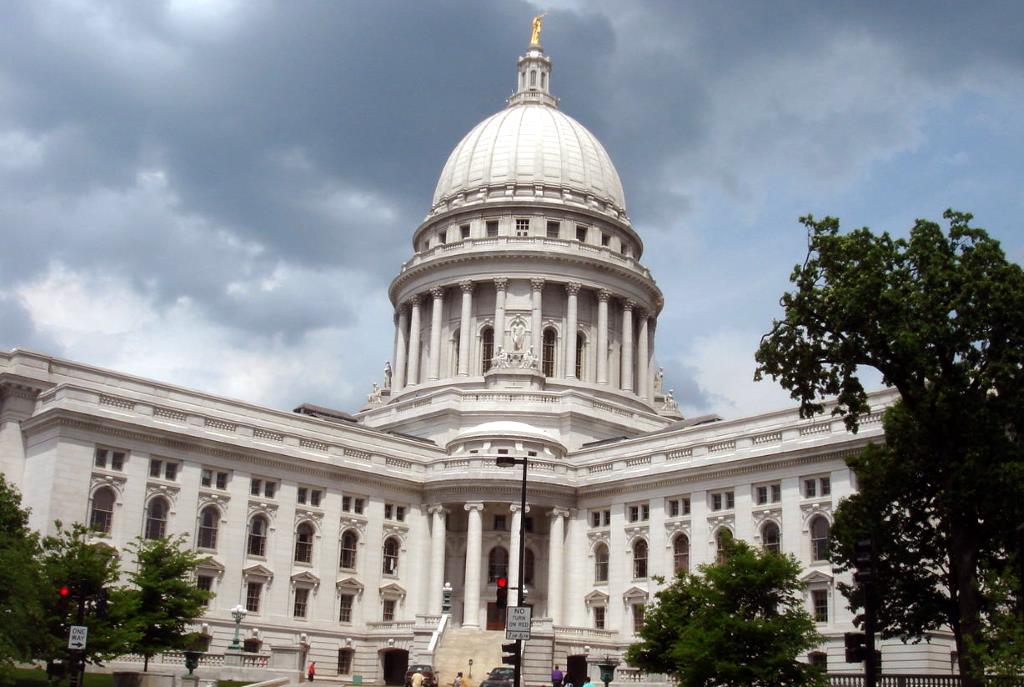11 Steps to More Honest Government
Stronger open records and open meetings laws needed.

Wisconsin State Capitol. Photo by Rosina Peixoto.
Those who call the shots in Wisconsin’s Capitol show themselves to be most comfortable working in the dark. They tried to butcher the state’s open meetings law, and only backed down when their action whipped up a public firestorm. They want to do away with the highly respected state audit office. They’re itching to turn a nationally acclaimed, politically independent elections and ethics watchdog agency into alapdog.
They must have a lot to hide.
With open government laws under assault, it’s easy to focus entirely on condemning the attacks and seeking to prevent further harm. It’s harder, especially in times like these, to take the time to think up ways to make our open government laws sturdier and the business of governing more transparent and trustworthy. It’s not enough to bear witness to destruction or even to try to stand in the way of the demolition crews. Blueprints for new construction need to be drawn.
It’s only a start, but here are 11 ways to bathe the encroaching darkness in light:
1. Require all legislative proposals – every bill, every amendment, every budget provision – to have named sponsors. Whoever wants a proposal drafted and considered has to be publicly identified.
2. Strengthen the open records law by clarifying how promptly government agencies must respond to public records requests. Wisconsin’s law just requires them to do it “as soon as practicable and without delay.” In Illinois – Illinois, for crying out loud – officials are given five business days to either comply with or deny a request or put in writing a darn good reason for needing more time. Maybe five days is not enough time, but 352 is definitely too much. That’s how long one Wisconsin newspaper was made to wait.
3. Further strengthen the open records law by narrowing the exemption for draft proposals. Once the official developing the proposal shares it with colleagues or other officials, it should be a public record.
4. Strengthen the open records law even more by clarifying that electronic records – or “electromagnetic information” as it’s called in Wisconsin’s law – have to be treated just like paper records when it comes to storage and retrieval. Make it abundantly clear that sudden mass email deletions and other destruction of electronic public records are crimes.
5. Create an open data law requiring the government to publish data online in an open format, and require government responses to public records requests to be made available in an open data format. Harnessing the power of the Internet to drive transparency, efficiency and innovation is gaining momentum globally, and was written into law for the first time anywhere in the U.S. by a major American city in 2010. Wisconsin has dabbled in a few open data projects, but has no overarching open data law.
6. Sharpen Wisconsin’s open meetings law to address the reality that members of public bodies too frequently go into closed session simply because they believe they can speak more candidly that way. When enough members are present to constitute a quorum, the meeting should be open to the public, with very limited exceptions. And it should be made clear that the open meetings law applies fully to the legislature, even when members of just one party gather.
7. Instead of dismantling the independent Government Accountability Board, make the GAB stronger by giving it the staffing and funds needed to carry out its duties and deal with the work backlog identified by a recent audit. That audit pointed out that the GAB keeps being given more and more to do on top of its regular workload, including administering recall elections in 2011 and 2012, overseeing a statewide election recount, implementing redistricting legislation, and preparing for a photo identification requirement for voting. Yet the GAB’s funding has actually shrunk, decreasing 3% from $5.8 million in 2009-10 to $5.6 million in 2013-14.
8. End the home-court advantage for public officials who find themselves in trouble. This would fix one of the two major flaws in the 2007 law establishing the Government Accountability Board. That law allows any legislators and other state officials accused of wrongdoing to be criminally prosecuted in the county where they live. All other citizens are charged where the offense allegedly occurred. This double standard gives state officials – and no others accused of crimes – the ability to go court shopping and choose where they will be tried.
9. Make Government Accountability Board records related to complaints and investigations public, and require all actions by the Board regarding complaints and investigations to be done in open session. Currently, records pertaining to complaints filed with the GAB and investigations by the agency are confidential, and all Board actions dealing with these matters take place in closed session. This change, along with repealing the law’s measure making it a crime punishable by up to nine months in jail and a $10,000 fine to publicly discuss or disclose any records about an investigation into ethics or campaign finance violations, would repair the second substantial flaw in the law creating the GAB and unmuzzle the watchdog.
10. Bring Wisconsin’s conflict of interest laws into the 21st Century. State law prohibits public officials from knowingly taking any action “substantially affecting a matter in which the official, a member of his or her immediate family, or an organization with which the official is associated has a substantial financial interest.” The law – written back in 1973, long before campaign contributions played the dominant role in elections they do today – is silent on whether political donations could create a conflict of interest for Wisconsin officials. Likewise, the state’s Code of Judicial Conduct allows judges to rule on cases involving their biggest campaign supporters. Both the judicial ethics code and the broader 1973 state law should be rewritten to disqualify officials from participating in decisions that could benefit individuals or groups that spend large sums to get them elected.
11. Follow Minnesota’s lead and ban gifts of travel and lodging to public officials from lobbying groups, even when passed through an organization that is not a registered lobbying group. Better yet, prevent the unregistered groups doing the passing of gifts from gaming the system by treating them as lobbying operations and requiring them to publicly disclose their activities and obey Wisconsin’s law prohibiting officials from accepting “anything of value if it could reasonably be expected to influence the state public official’s vote, official actions or judgment, or could reasonably be considered as a reward for any official action or inaction.”
Here you have 11 ideas for making governing more open and honest that should be under active consideration at the Capitol but currently are not. Surely others can come up with another 11. Or 111. There is much to be done to reverse Wisconsin’s descent into darkness.
Mike McCabe, president of Blue Jean Nation, a nonpartisan citizen group working to transform our political system.
Op-Ed
-
Wisconsin Candidates Decry Money in Politics, Plan to Raise Tons of It
 Dec 15th, 2025 by Ruth Conniff
Dec 15th, 2025 by Ruth Conniff
-
Trump Left Contraceptives to Rot; Women Pay the Price
 Dec 8th, 2025 by Dr. Shefaali Sharma
Dec 8th, 2025 by Dr. Shefaali Sharma
-
Why the Common Council’s Amended Budget is Good Policy for Milwaukee
 Nov 20th, 2025 by Alds. Marina Dimitrijevic and Russell W. Stamper, II
Nov 20th, 2025 by Alds. Marina Dimitrijevic and Russell W. Stamper, II






















10. Bring Wisconsin’s conflict of interest laws into the 21st Century.
Just one example of the impact of these lax laws. The GAB ruled that it’s fine for Bucks co-owners to serve on the state-chartered Bradley Center board, even as the board’s chair. They simply must leave the room when the board votes on leases and other Bucks-related business.
One key reason the completely donated Bradley Center is now $20M in debt is because sweetheart leases pay out huge revenue shares to the Bucks.
When the for-profit Bucks completely manage the new “nonprofit” arena, how will any state-chartered board of political appointees look out for the public’s interest? The Bucks will surely not start opening their books. The scamming potential is unlimited.
Your #8 would make government much less democratic. Most suspects under investigation commit acts their home county, and so have the same “home court advantage”. Since state officials have to work in Dane County, your #8 would give a permanent advantage to Dane County voters to choose judges and prosecutors to oversee crimes that affect the whole state. That would create two classes of voters and substantially infringe on the rights of most Wisconsinites to hold their own officials accountable. Behavior that Dane County voters find suspicious would be investigated before behavior other Wisconsinites found worth of investigation. It makes perfect sense that officials are held accountable by their own voters not only those that happen to live near the Capitol.
Another alternative could be to have the Attorney General and Supreme Court directly handle wrongdoing by state officials, but it could take up a lot of their resources.